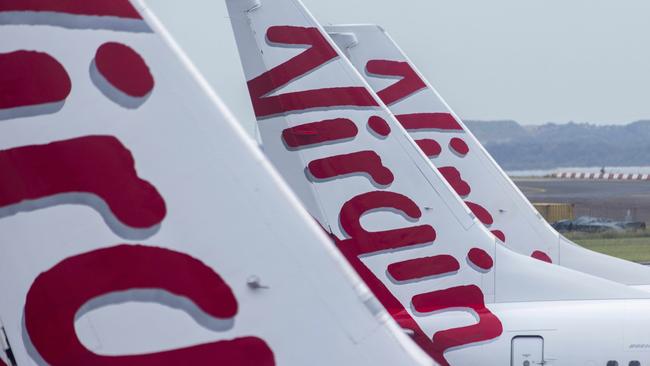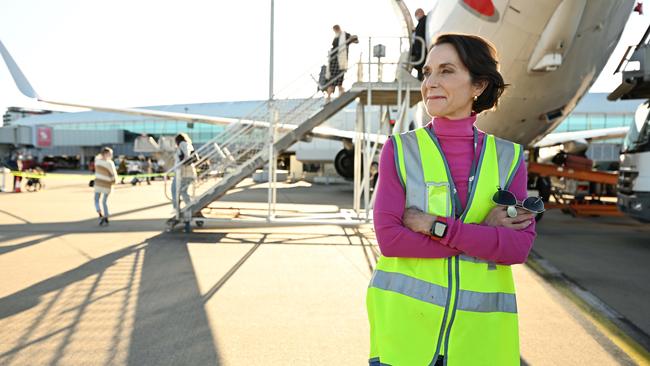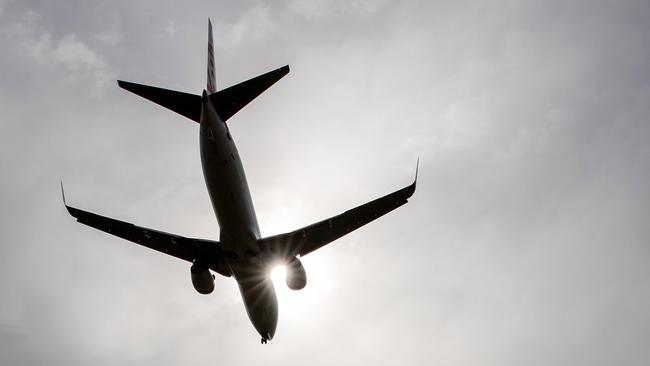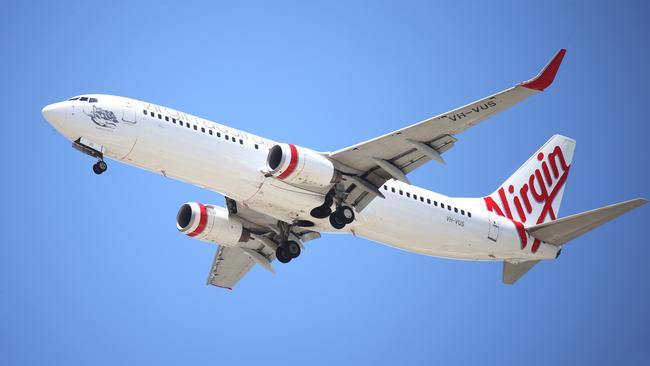Qantas turmoil now a factor for timing of Virgin’s IPO
The aviation boom is starting to fade, leaving only a narrow window of opportunity for Virgin’s private equity owner to pull the trigger on a public float.

Business
Don't miss out on the headlines from Business. Followed categories will be added to My News.
Former Qantas boss Alan Joyce has been blamed for a lot of things lately and this could even extend to pushing back the return to the stock market of long time rival Virgin Australia.
Virgin owner Bain Capital is now eyeing late into the March quarter as the next window for the $3bn-plus stock market listing of Virgin – a moment that will mark the final leg in the resurrection of the airline that collapsed during the early days of the Covid-19 pandemic.
With new Qantas boss Vanessa Hudson vowing to spend big to win back customers and trust in the dominant carrier in the wake of Joyce’s missteps, airline investors reckon the fight for Virgin is going to get tougher in the domestic market.
This means ticket prices may have already peaked for now. This is good for passengers but not so much for investors.
Bain has quietly drawn a line through the November date that was one of the options it had been considering for Virgin’s return to the ASX.

And at Virgin’s South Brisbane headquarters chief executive Jayne Hrdlicka has told her executives to not be distracted by the management changes at Qantas and the regulatory pressure being heaped on its rival – and to instead keep the focus on Virgin’s strategy and multi-year rebuild into a profitable business.
She has also urged staff to let Bain worry about the timing of a listing, which means management can focus on running the airline.
Taking-off
Virgin’s latest accounts tell a story of an airline which is rapidly on the mend after being financially crushed through Covid-19. It’s a similar story to Qantas as both airlines experience a revenue surge from passengers rushing airlines, while profit margins remain high given demand continues to outstrip capacity.
Where Virgin’s Hrdlicka has an advantage over Qantas is her airline is being rebuilt from ground up and with a lower cost base. And through the creditors process, Virgin was able to write down much of its debt, giving it more financial headroom and more options with a $1bn cash pile on the balance sheet. Net debt is now $1.2bn.
And being privately owned has worked in Virgin’s favour for now as it means management too has been able to undertake much of the rebuilding out of the public gaze.
The accounts show Virgin delivered a net profit of $129m for the year to the end of June, marking its first bottom-line profit in 11 years. This compares with a loss last year of $565m. Revenue more than doubled to $5bn. Pre-tax earnings, a figure closely watched in airlines, came in at $439m, compared with a loss of $278m last year. While the domestic airline rebound is driving the result, Virgin’s Velocity loyalty business continues to be fast growing, delivering a 30 per cent jump in earnings to $77m.

Operating margins are running at a robust 8.8 per cent which are behind Qantas’ 13.5 per cent
There is still work to do because the airline is sitting on negative net equity of $1.3bn, although in airline accounting $1.8bn has been booked as a liability against unearned revenue – that is revenue that has been received for future flights.
Virgin is seeing continued record demand for leisure and return of SME customers, while corporate travel is in a slower recovery cycle.
Hrdlicka told Virgin’s staff at a town hall briefing the latest results represent a milestone for the airline with the transformation under way. She pointed to the $110m refurbishment under way that includes the rollout of in-flight Wi-Fi and an overhaul of economy and business class seats.
It too is now seeing the arrival of new fuel-efficient Boeing 737-8 aircraft, taking its total fleet size to 99. There is more to come on the technology side that is expected to wring out more efficiency from the business.
Virgin is running between 30 per cent and 33 per cent share of the domestic market and the mantra from its South Brisbane headquarters is it is comfortable with that, given the focus is on sustainable profit, not market share growth.
For years the battle between Joyce and Virgin was around Qantas doing whatever it takes to hold its 65 per cent market share.
IPO windfall
Bain picked up Virgin for a song three years ago, paying a little under $600m for the airline while much of the headline price tag of $3.5bn was inflated by debt that remained with the business. Shareholder capital sitting in the airline now gives it a book value of $2.2bn.
But in providing a much needed capital bridge during a period of significant uncertainty, the private equity player stands to make a windfall on its bet, even if markets continue to be rocky.
Virgin’s latest accounts show Bain has already enjoyed a $730m payout from its airline investment, partly funded by a bridge loan. This means unless there’s another external shock similar in magnitude to Covid-19, it’s all financial blue sky for Bain.

Bain hasn’t publicly committed to an IPO time frame, but has said that any future sharemarket listing of Virgin it will retain a significant shareholding in the airline.
To be fair, Qantas can’t be entirely blamed for the rapidly turning sentiment towards aviation. And the gauge of support for airline stocks is the single biggest driver of Bain’s appetite to pull the trigger on a Virgin IPO.
Airline stocks around the world have sharply come off their mid-July peaks, suggesting the market believes the best of the post-Covid boom is behind the sector.
In that period Qantas shares are down 25 per cent, US majors American Airlines and Delta are off 34 per cent and 27 per cent respectively. Singapore Airlines is down 17 per cent in recent months, while European major IAG, which didn’t get as much of a post-Covid share bounce, is still down 14 per cent.
Although air travel is in high demand, soaring interest rates are curbing discretionary spending. At the same time the rush of capacity being added to the market with new flights and new routes means it is becoming harder for operators to pass on surging costs, such as fuel and inflation, through ticket prices.
For Bain there’s only a narrow window to get the timing right on an IPO. If it holds on to Virgin too long, it might end up floating the company at a time when top-line growth has stalled with the sector swinging back to the old days of a capacity glut.
And if it moves too early it is selling Virgin into a market which is being crushed by rising interest rates.
johnstone@theaustralian.com.au
Originally published as Qantas turmoil now a factor for timing of Virgin’s IPO



